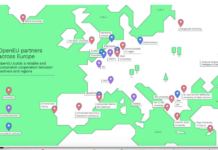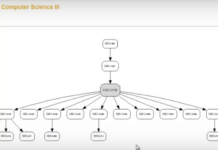Image: © Justin Grimes, The Guardian, 2013
Campbell, G. (2016) Networked learning as experiential learning Educause Review, Vol. 51 No. 1, January 11
This is an interesting if somewhat high level discussion by the Vice-Provost for Learning Innovation at Virginia Commonwealth University, USA, of the importance of networked learning as experiential learning:
the experience of building and participating within a digitally mediated network of discovery and collaboration is an increasingly necessary foundation for all other forms of experiential learning in a digital age. Moreover, the experience of building and participating within a digitally mediated network of discovery is itself a form of experiential learning, indeed a kind of metaexperiential learning that vividly and concretely teaches the experience of networks themselves.
This article might be useful for those who feel a need for a pedagogical or philosophical justification for networked learning. However, I have two reservations about Campbell’s argument which are closely related:
- Campbell appears in one part of the article to be arguing students need some kind of academic training to understand the underlying nature of digital networking, but he is not too clear in the article about what that entails or indeed what that underlying nature is, beyond the purely technical;
- second, I struggled to see what the consequences of the argument are for me as a teacher: what should I be doing to ensure that students are using networked learning as experiential learning? Does this happen automatically?
I think Campbell is arguing that instructors should move away from selecting and packaging information for students, and allow them to build knowledge through digital networks both within and outside the academy. I of course agree with this part of the argument, but the hard part is knowing the best ways to do this so that learners achieve the knowledge and skills they will need.
As with all teaching methods, networked learning and/or experiential learning can be done well or badly. I would like to see (a) a more precise description of what networked learning means to Gardner in terms of practice, and (b) some guidelines or principles to support instructors in using networked learning as a form of experiential learning. This needs to go beyond what we know about collaborative learning in online groups, although even the application of what we know about this would be a big step forward for most instructors.
Without a clear analysis of how digital networking results in learning, and how this differs from non-digital networked learning, networked learning runs the risk of being yet another overworked buzzword that really doesn’t help a great deal.
Despite my reservations I encourage you to take a look at this article and see if you can make more sense of it than I have, because I believe that this is a very important development/argument that needs further discussion and critical analysis.
For a more pragmatic take on this topic see:
LaRue, B. and Galindo, S. (2009). ‘Synthesizing Corporate and Higher Education Learning Strategies’. in Rudestam, K. and Schoenholtz-Read, J. (eds.) Handbook of Online Learning: Innovations in Higher Education and Corporate Training Thousand Oaks, CA: Sage Publications.










 Dr. Tony Bates is the author of eleven books in the field of online learning and distance education. He has provided consulting services specializing in training in the planning and management of online learning and distance education, working with over 40 organizations in 25 countries. Tony is a Research Associate with Contact North | Contact Nord, Ontario’s Distance Education & Training Network.
Dr. Tony Bates is the author of eleven books in the field of online learning and distance education. He has provided consulting services specializing in training in the planning and management of online learning and distance education, working with over 40 organizations in 25 countries. Tony is a Research Associate with Contact North | Contact Nord, Ontario’s Distance Education & Training Network.

